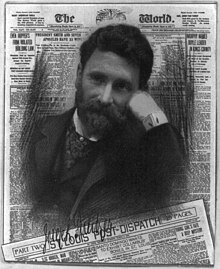Joseph Pulitzer

Joseph Pulitzer (April 10, 1847 – October 29, 1911) was a Hungarian-American politician and newspaper publisher of the St. Louis Post-Dispatch and the New York World. He became a leading national figure in the Democratic Party and was elected congressman from New York.
In the 1890s the fierce competition between his World and William Randolph Hearst's New York Journal caused both to develop the techniques of yellow journalism, which won over readers with sensationalism, sex, crime and graphic horrors. The wide appeal reached a million copies a day and opened the way to mass-circulation newspapers that depended on advertising revenue (rather than cover price or political party subsidies) and appealed to readers with multiple forms of news, gossip, entertainment and advertising.
Pulitzer's name is best known for the Pulitzer Prizes established in 1917 as a result of his endowment to Columbia University. The prizes are given annually to recognize and reward excellence in American journalism, photography, literature, history, poetry, music, and drama. Pulitzer founded the Columbia School of Journalism by his philanthropic bequest; it opened in 1912.
| This article about a political figure is a stub. You can help out with Wikiquote by expanding it! |
Quotes
[edit]- We will always fight for progress and reform, never tolerate injustice or corruption, always fight demagogues of all parties, always oppose privileged classes and public plunderers, never lack sympathy with the poor, always remain devoted to the public welfare, never be satisfied with merely printing news, always be drastically independent, never be afraid to attack wrong, whether by predatory plutocracy or predatory poverty.
- Joseph Pulitzer, New York World (May, 1883)
- Our republic and its press will rise or fall together. An able, disinterested, public-spirited press, with trained intelligence to know the right and courage to do it, can preserve that public virtue without which popular government is a sham and a mockery. A cynical, mercenary, demagogic press will produce in time a people as base as itself. The power to mold the future of the Republic will be in the hands of the journalism of future generations.
- “The College of Journalism,” The North American Review (May, 1904) p. 680
- I know that my retirement will make no difference in its [my newspaper's] cardinal principles, that it will always fight for progress and reform, never tolerate injustice or corruption, always fight demagogues of all parties, never belong to any party, always oppose privileged classes and public plunderers, never lack sympathy with the poor, always remain devoted to the public welfare, never be satisfied with merely printing news, always be drastically independent, never be afraid to attack wrong, whether by predatory plutocracy or predatory poverty.
- Retirement speech, April 10, 1907, as reported in the St. Louis [Missouri] Post-Dispatch (April 11, 1907).
- There is not a crime, there is not a dodge, there is not a trick, there is not a swindle, there is not a vice, that does not live by secrecy.
- Brian, Denis. Pulitzer: A Life, p. 377. John Wiley and Sons, Oct 1, 2001
- Every issue of the paper presents an opportunity and a duty to say something courageous and true; to rise above the mediocre and conventional; to say something that will command the respect of the intelligent, the educated, the independent part of the community; to rise above fear of partisanship and fear of popular prejudice. I would rather have one article a day of this sort; and these ten or twenty lines might readily represent a whole day's hard work in the way of concentrated, intense thinking and revision, polish of style, weighing of words.
- Letter to the editor of the New York World (1911), quoted in Pulitzer: A Life, Denis Brian, New York, NY, John Wiley & Son, Inc. 2001, p. 1


